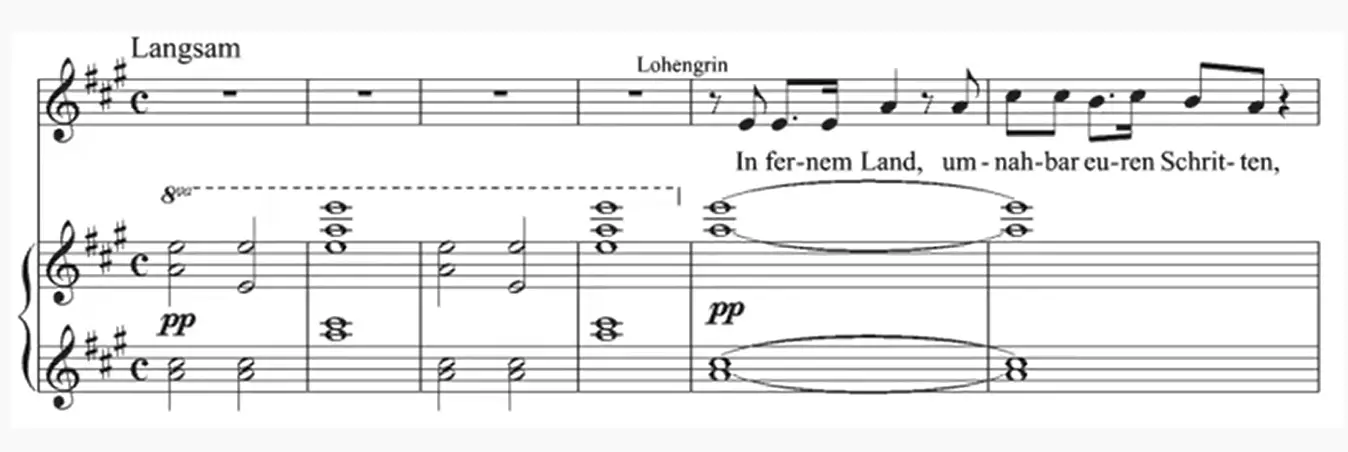IN FERNEM LAND – an aria from the opera Lohengrin
The online opera guide to Wagner’s aria IN FERNEM LAND
Read Interesting facts and hear great YouTube Videos about the famous Aria “IN FERNEM LAND”.
If you want to hear more about the opera LOHENGRIN, click on the link to the opera portrait
The aria – synopsis & background
Synopsis: The German King Heinrich has come to Brabant. He wants to obligate this part of his empire to serve against the Hungarian attackers. Elsa was accused of killing her brother. Now the king is to judge in front of the court tree. Elsa is given the opportunity to defend herself in court. But instead of defending herself, Elsa tells of her grief over the death of her brother and of a dream that a knight will appear who will fight for her and prove her innocence. Lohengrin appears and promises to fight for her, but only on condition that she never asks him for his name or origin. After an intrigue of Ortruds and Telramunds, Elsa asks him the question on the wedding night. The spell is broken and Lohengrin solemnly proclaims his origins to everyone. He is a knight of the Holy Grail, who has come from Montsalvat Castle. His father is Parzival. He himself is his knight, called Lohengrin. He was sent by the Grail to fight evil and protect virtue.
Similar to the Tannhäuser with the Roman tale of the last act, the tenor must sing his most important section at the end of the opera. This means that the singer must have sufficient vocal power to bring this section to a climax of the evening. In Lohengrin, the task is “easier” than in Tannhäuser since the Grail Narration (“In fernem Land”) and his farewell (“Mein lieber Schwan”) are lyrical pieces with an almost bel canto character, while the Roman Tale requires a dramatic voice.
Lohengrin’s story is at a solemn, measured pace. The voice must be dignified, yet light, brilliant and mysterious, far from the pathetic and heroic. The piece is introduced by the orchestra. A shimmering A major is audible in pianissimo. The tenor begins effortlessly, on an unstressed note.
The intensity is increasing. Lohengrin proudly sings of the Grail «ein Gefäss von wunderthätgem Segen» («therein is a vessel of wondrous blessing»).
In a solemn voice he sings the praises of the annual miracle «Alljährlich naht vom Himmel eine Taube um neu zu stärken seine Wunderkraft. Es heisst der Gral» («every year a dove descends from Heaven to fortify its wondrous power. It’s called the grail»). A beautiful soft forte in A shines over the buzzing sound of the violins.
The high tessitura of the following passage keeps the drama and solemnity high. It is a demanding passage for the tenor to keep the vocal power high without overstraining his voice.
At the end Lohengrin reveals his name. Now the voice changes, it becomes magnificent, glorious and heroic, by no means hollow, but noble. It is the highlight and key of the opera.
The Grail Narrative ends with a solemn orchestral finale.
The Aria – the text of IN FERNEM LAND
In fernem Land, unnahbar euren Schritten,
Liegt eine Burg, die Montsalvat genannt;
Ein lichter Tempel stehet dort inmitten,
So kostbar, als auf Erden nichts bekannt;
Drin ein Gefäß von wundertät’gem Segen
Wird dort als höchstes Heiligtum bewacht:
Es ward, daß sein der Menschen reinste pflegen,
Herab von einer Engelschar gebracht;Alljährlich naht vom Himmel eine taube,
Um neu zu stärken seine Wunderkraft:
Es heißt der Gral, und selig reinster Glaube
Erteilt durch ihn sich seiner Ritterschaft.Wer nun dem Gral zu dienen ist erkoren,
Den rüstet er mit überird’scher Macht;
An dem ist jedes bösen Trug verloren,
Wenn ihn er sieht, weicht dem des Todes Nacht.Selbst wer von ihm in ferne Land’ entsendet,
Zum Streiter für der Tugend recht ernannt,
Dem wird nicht seine heil’ge Kraft entwendet,
Bleibt als sein Ritter dort er unerkannt.
So hehrer Art doch ist des Grales Segen,
Enthüllt – muß er des Laien Auge fliehn;
Des Ritters drum sollt Zweifel ihr nicht hegen,
Erkennt ihr ihn – dann muß er von euch ziehn.
Nun hört, wie ich verbotner Frage lohne!
Vom Gral ward ich zu euch daher gesandt:
Mein Vater Parzival trägt seine Krone,
Sein Ritter ich – bin Lohengrin genannt.
Far and away, unapproachable to your stepsThere is a castle called Montsalvat;In the middle there stands a luminous temple,As precious as nothing else on earth is known.
A vessel of miracoulos blessingIs guarded inside as supreme sanctuary.It has been brought down by a host of angels,To be cared for by the purest human beings.Annually a dove from above approachesTo reinforce its miraculous power;Its name is Sangrail, and it grants blissfully purest believeTo its knighthood.Who is predestined to serve the SangrailIt prepares with supernal power;Every evil’s deception is lost to him,When he sees it, death’s power vanishes;Even to him who is sent by it to alien lands,Appointed as fighter for virtue’s justice,His holy power will not be taken away,If he goes unrecognized there as its knight.May the Sangrail’s blessing be ever of so noble cast,It must flee the layman’s eyes when it is unveiled.Therefore you shall not doubt the knight,If you recognize him – he has to leave you.
Now listen, how I reward the forbidden question:By the Sangrail I was sent to you:My father Parzival wears its crown,His knight, I – am called Lohengrin.
Written for a Heldentenor
The role of Lohengrin is written for a “Heldentenor”. This Fach can only be mastered by a few tenors. The roles are reserved for experienced singers, as a young voice can quickly be damaged. The physical demands on the singer are immense. The duration of the opera is usually very long and the accompaniment by the orchestra is loud and dense. The number of outstanding representatives of this fach is small and the artists are sought-after and usually booked years in advance.
Famous interpretations of IN FERNEM LAND
We hear this piece in different interpretations. We start with Jussi Björling’s.
“A few weeks before his death, Björling sang the story of the Grail for the first and last time in public. Even if the Swedish language is not necessarily suitable for the Lohengrin, even if it is still at the beginning in terms of interpretation, is sung too burschikos and also contains a musical error – here it is, the ideal Lohengrin voice. Björlings has perhaps been the greatest loss to Wagner’s singing imaginable: Distance and distance from the world and painfully tinted sensuality”. (Fischer, large voices). For example, his crescendo (1:55) is breathtaking and the melancholy hovering over the interpretation is incredibly harmonious.
In fernem Land – Björling
We hear a second recording from 1940 from another Scandinavian. The Dane Lauritz Melchior was perhaps the greatest Wagner tenor in history. His vocal reserves seem inexhaustible and his diction is excellent, probably dating back to his Bayreuth days, when he rehearsed the role with Cosima Wagner.
In fernem Land – Melchior
In the next recording we hear Franz Völkers. Völkers Lohengrin is among the great of Wagner singing. Kesting: “His Lohengrin under Tietjen belongs to the fulfilling moments of Wagner singing. He captivates with an expressive phrasing and a tone of lyrical magic.” Fischer (great voices): “In the thirties, Völker set Lohengrin standards that have not been surpassed to this day. His combination of heroic baritonal power and lyrical sensibility was balm for the souls and ears of those Wagnerians who were fed up with “Bell-Canto”. (bell is german and means “the dog’s bark”).
In fernem Land – Völkers
Nicolai Gedda sings an enraptured monologue.
In fernem Land – Gedda
Aureliano Pertile sang this piece in Belcanto style. This recording from the 20’s is sung in Italian language. Pertile was Toscanini’s favourite singer. The interpretation is somewhat unusual when compared to Melchior’s version, but it is highly regarded in professional circles.
In fernem Land – Pertile
Domingo sang Lohengrin for the first time in 1968, but he saw that he was not yet ready. The voice suffered from the strain. And only 15 years later he sang it again. With a lot of bel canto he meets Franz Liszt’s demand.
The critics agreed that Domino’s Lohengrin is a great asset. The splendour of his voice and lyrical bel canto create a captivating, harmonious picture and delight the listener.
There were only discussions about articulation. His German pronunciation has great weaknesses. The majority of the critics did not mind, Arnold Whittal even mockingly said that “after all, Lohengrin is a stranger in Brabant, and Monsalvat is closer to Madrid than to any northern city”. Of course, there were also purists who described the accent as no-go.
In fernem Land – Domingo
Peter Lutz, opera-inside, the online opera guide to the aria “IN FERNEM LAND” from the opera Lohengrin from Richard Wagner.








Where is Jonas Kaufmann on this list? His “in fernem Land” is sublime.